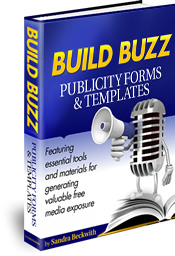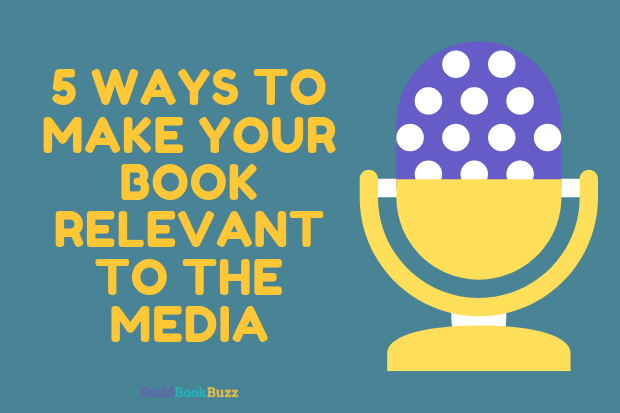5 ways to make your book relevant to the media
When I ask authors what they’re doing to promote their books, they often say they built a website, or they’re posting about it on social media.
Rarely do they mention going after the free news media exposure known as publicity. They aren’t trying to get their books mentioned in short news briefs or longer articles, and they’re not pursuing talk show and podcast interviews.
They’ve given no thought to how to make their book relevant to the media.
And yet, doing this costs nothing, and is at least 10 times as effective as advertising. What’s more, you can get book publicity whether your book is new or has been published for years.
It’s not as hard as you might think
You don’t need special skills or tools, either. You just need to know how the media works and what it needs from you.
A big piece of this is understanding how to make your book and its topic relevant to the press.
It comes easily for some, not so much for others. For the most part, it requires paying attention to topics covered by the press and the sources they use for information.
Here are five tips that will help you become one of those sources.
1. Get plugged in.
If you want publicity, you need to be a consumer of news.
Read at least one daily newspaper, follow a few blogs, watch TV news, and become familiar with cable TV talk shows.
The more you know about what’s out there, the better able you will be to understand where you, your book, and the topics or issues you write about will fit into the media landscape.
2. Study your target media outlets for format and approach.
After you determine which media outlets influence your ideal readers, you want to study them so you understand the content they use.
What sorts of segments or stories do they run? How many sources do they use? Are the articles or segments short or long? Do they frequently site statistics from surveys or research?
Use an Excel file or Word table to make notes and look for trends that will guide how you approach each outlet.
3. Learn what’s making news and connect your topic to it.
Marketers refer to this as “newsjacking” — hijacking the news.
It’s important to stay current and continually brainstorm ways to link your topic to what is currently newsworthy. For example, anyone who has written about gun control, whether in fiction or nonfiction, could be doing lots of media interviews right now (unfortunately).
It’s easier than ever to stay on top of the news, thanks to smartphone apps. Make sure you’re getting alerts so you don’t miss any opportunities.
If connecting your topic to trending topics is difficult for you, ask a friend to help you brainstorm connections between the range of topics in your book and what’s making news today and this week.
4. Stay at the forefront of your topic.
This will allow you to spot trends. This is important because trends make good article/segment ideas.
It’s not hard to see how this applies to nonfiction authors, but it works for fiction, too. Here’s how this can apply to novelists.
Let’s say you’ve written a novel about a youthful executive who tires of the corporate rat race and takes an extended leave that includes visiting a Montana retreat to enjoy his passion, fly fishing. While he figures out what he wants to do with the rest of his life, the executive begins tying flies for a local bait shop. There, he meets an older fly fisherman who is vacationing with his daughter, an up-and-coming professional at a crossroads of her own.
The executive falls in love with the daughter, there’s tension and drama, you know the drill. But let’s not get distracted by that. The key topic here is fly fishing.
As the (pretend) author of this book, you know a lot about fly fishing, right? You have to in order to write about it authentically.
Pitch trend stories
When you stay current on that topic – the most popular flies, the best yet-to-be-discovered fishing locations, the impact of technology on the sport – you can spot trends.
Use them to pitch a story to the press based on those trends, and get yourself quoted as an expert resource. All the research you did for the character in your book – and your effort to stay current – provides the credentials you need.
Be open to this possibility. Don’t under-estimate how much you know about the topics you write about, whether it’s in your nonfiction book or your novel.
5. Get current on publishing industry news, trends, and developments.
Imagine what you could have done to get publicity with your local media when USA Today reported on research revealing that reading fiction might make us smarter and more empathetic.
Did you see the news earlier this year that half of all Americans have now listened to an audiobook? If your book is available in audio format, you can take advantage of this research to be interviewed by your local press about this topic. Pitch the daily newspaper or a radio or TV talk show about the growth in audiobooks and why. Talk about why your book is available in that format.
Do you write poetry? Did you know that IngramSpark reported earlier this year that the poetry genre is at the top of the company’s best-sellers list? Is there a local talk show host who might be interested in talking about why? Could you organize a gathering of poets with your local bookstore?
The more you know about publishing, the more you’ll be sought out for interviews and speaking engagements. Start locally first, then regionally. You might be surprised at how easy it will be for you to become the local publishing industry expert — as long as you make the effort to always be learning.
Understand that it’s rarely all about you.
A major feature on a topic or trend nearly always uses more than one source.
Know that, and be prepared to seal the deal by offering others who can comment on the topic. Being prepared and realistic, and making it easier for a journalist to say “yes,” can make you and your book very, very relevant.
That, in turn, will generate the news media attention — the book publicity — that sells books.
Use the right tools
Getting and keeping your book title in the news does take some effort and thought. But what promotional effort doesn’t?
Once you understand the type of information your targeted media outlets use and how they present that information, you’ll find yourself generating the types of article or segment ideas that get used. Then you’ll be snagging priceless media exposure for your book.
Need some help?
 Need a little help? Get the media relations tools you need for this in Build Book Buzz Publicity Forms & Templates, a collection of fill-in-the-blanks forms and corresponding samples for book publicity.
Need a little help? Get the media relations tools you need for this in Build Book Buzz Publicity Forms & Templates, a collection of fill-in-the-blanks forms and corresponding samples for book publicity.
Whether you need to know how to write the “pitch” letter for a newspaper or magazine article idea or the sample Q&A you’ll create for radio talk show interviews, you get everything you need in one resource. Copy and paste the templates into a Word file, fill them out, and use the result to generate priceless book publicity.
Learn more at http://buildbookbuzz.com/publicity-forms-and-templates/.
What’s one of your media exposure goals for this year?
(Editor’s note: This article was first published in January 2013. It has been updated and expanded.)
Like what you’re reading? Get it delivered to your inbox every week by subscribing to the free Build Book Buzz newsletter. You’ll also get my free “Top 5 Free Book Promotion Resources” cheat sheet immediately!


Excellent information !!!!
Thanks, Aaron!
Sandy
Thanks for the fantastic tips, From a children author who’s making a difference in today’s youth.
I’m so glad you found them helpful, William!
Sandy
Thank you,especially for the affirmation that the research we do is an ongoing asset for publicity.
It is, Elizabeth, and not enough authors — novelists, in particular — use it that way.
Sandy
I’m long overdue posting on your newsletter. I appreciate the info you provide. All good stuff!